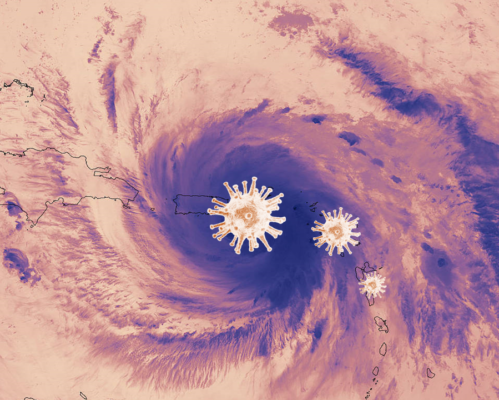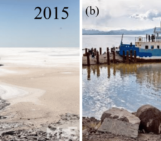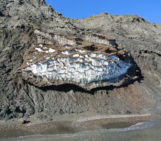
Note by the editors: In the unique period our world is currently facing, we have decided to open our blog to hear the voices of our young climate scientists from around the globe. This is an opinion piece provided by two early career climatologists from Argentina and the Netherlands.
I just arrived at home with a bunch of groceries from the supermarket after encountering some very empty shelves. I have bought lots of tinned food that should provide enough for the coming weeks, if worst comes to the worst. As the front door shuts behind me and I get ready to stay at home for the foreseeable future, I hear news reports that it is coming closer and that we need to prepare for when it will hit our towns and communities. The advice is to remain calm and to stay at home. Yet this hurricane is gaining speed, reaching category 5 and it may arrive at our front door any second…
The COVID-19 crisis might have more in common with extreme weather events than you first expect. Both are rare cases and both have a high impact on society. For such unprecedented events, preparedness helps to cope with the situation. But as experience has taught us, extreme events are often underestimated; their magnitude and extent only become clear during the course of the event and in hindsight afterwards. Rapid actions are taken to fight against their worst symptoms, but these often remain insufficient for dealing with the overwhelming situation. The main focus lies on saving as many lives as possible during the course of the event. In addition, both COVID-19 and extreme weather events do not respect borders, and cities across the world become epicenters of their impacts. The vulnerable groups in society suffer the most. The available international guidance on how to prepare and cope with the events needs to be adapted quickly and adequately to the highly diverse regional-to-local context, and needs to be iterated on a continuous basis as the event evolves. Improved measures and acquired knowledge may increase resilience after the event, but this depends on how the situation is dealt with during and after the event.
COVID-19 has spread across nearly the entire globe in a matter of months. Although recurring extreme weather events often take place over longer time scales, certain aspects of COVID-19 could be perceived as analogous to extreme weather events, but in this case occurring in rapid succession across the globe. The impacts are replicating so quickly that resources run out and people have to transform their lives, and adapt to survive. COVID-19 is a fast-moving example of what climate change could be, in a nutshell, on a longer timescale.
What’s more, extreme events, such as storms, heat waves, floods, wildfires, will likely be exacerbated by climate change. That is, they may happen more frequently and/or become more intense in the upcoming decades. COVID-19 could be seen as a particular case of an extreme event that has an effect mainly on human lives and its economics and political activities. Climate extremes can also directly affect the infrastructure, ecosystems, food systems, water availability, and so on. In that light, COVID-19 might give us insights as to what we are heading for and also shed light on the main opportunities and challenges that lie in front of us. Preparedness is key in every type of extreme event. The world needs to be prepared for climate crisis and to reconsider its political actions and economic strategies at this crucial time where the cards are reshuffled.
Our current lifestyle during the COVID-19 crisis is closer to reaching the 1.5°C Paris Agreement goal than ever considered to be possible before COVID-19 broke out. People around the world have quickly changed their routines in response to the different restrictions imposed due to COVID-19. This has already led to large decreases in air pollution worldwide and may have longer lasting impacts than we think. Particularly for the developed world, the adaptation implies widespread adoption of remote working, cancelling of many in-person meetings, travelling less (particularly by airplane), and reducing consumption of non-essential goods. Those living in developing economies may be forced to pursue similar lifestyle changes, but face additional financial and social challenges and are left with little help from the global community. While it seems unrealistic to expect these radical lifestyle changes to last after COVID-19, it gives a clear indication of what is possible and how humans are capable of adapting. In shaping up the longer term strategies to deal with COVID-19, we may envision aspects of these transformed lifestyles to remain at the heart of a sustainable future.
These rapid changes show us what is possible, but policies and economic measures underpinning the ‘rebuilding phase’ after the event will be crucial to increase our resilience and ensure we create a stable society in the long run. Considering COVID-19 as well as past and projected extreme weather events, we may keep a few aspects closely in mind while we are defining our future societal paths.
Measures to safeguard our economies should focus on green growth and vitalising the components of the economy that ensure a transformative future towards sustainability. While COVID-19 is projected to have substantially negative impacts on the global economy, the changes necessary to adapt and to mitigate climate change are expected to have largely positive impacts. For instance, losses from the impacts of extreme weather events would be reduced, and green growth can create new job opportunities and opens up new markets that could strengthen the economy on the longer run.
To achieve these goals we will need increased international collaboration, such as reopening borders as soon as possible and global solidarity, particularly among neighbouring countries, as well as between the global north and south. There is a recurring need to reduce global inequality, as our globally interconnected system is only as strong as the weakest link in our chain.
A way forward could be to take the path of ‘glocalization’. For instance, by pursuing value chains of products that are diversified and fair, that are global in nature but with well-picked local components, so as to be less easily disrupted by extreme events. It is the time to revise our perceptions of globalization, particularly how it prioritizes economic profit over social wellbeing, natural resources, and the environment.
Evidence-based knowledge lies at the core of any extreme event, whether we are preparing, dealing with or rebuilding. To develop our strategies in each of these phases, a strong connection to science is pivotal. An enhanced integration of scientific evidence and knowledge into policy structures and decision-making on a local to regional to global scale is needed to prepare us for the next pandemic, as well as any extreme weather event.
We all draw different lessons from a crisis. From how to balance work and family life in a home setting, to these views of two early career climatologists from different sides of the globe. We live in a fast changing world, with plenty of challenges and opportunities for the generations to come. Let us draw our lessons from the extreme weather events we experienced in the past, and our current experiences with COVID-19, and adequately prepare for the longer-term climate change crisis and all its extreme events.
This piece reflects the personal opinion of the authors, and does not express the views or opinions of the affiliated institutions.
This post has been edited by J. Bösken and G. Messori.


